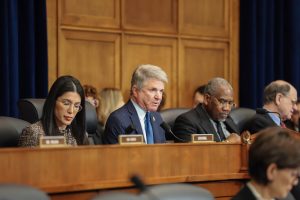Chairman McCaul Delivers Remarks at Hearing Examining Biden Administration’s Catastrophic Afghanistan Withdrawal
Washington, D.C. – Today, House Foreign Affairs Committee Chairman Michael McCaul delivered remarks at a full committee hearing entitled, “Behind the Scenes: How the Biden Administration Failed to Enforce the Doha Agreement.” In his opening remarks, Chairman McCaul questioned the decision made by President Biden and Secretary of State Antony Blinken to abandon Afghanistan, in spite of warnings from high-level advisors and American officials, including U.S. Special Representative for Afghanistan Reconciliation, Zalmay Khalilzad, who testified before the committee. Chairman McCaul also condemned the Biden administration’s failure to enforce the conditions of the U.S.-Taliban peace deal, known as the Doha Agreement, or adequately plan for the U.S. withdrawal which ultimately led to the deaths of 13 American servicemembers.

– Remarks as Delivered –
Today’s hearing comes at a crucial moment in this committee’s investigation into the Biden administration’s catastrophic withdrawal from Afghanistan.
For months after President Biden announced the withdrawal, his senior military advisors and his own intelligence community repeatedly issued dire warnings about the damage this would create.
At the same time I, along with other Republican and Democrat Members of Congress, urged President Biden to uphold the conditions of the Doha Agreement.
And, most importantly, we urged him to prepare for the eventual fallout of our withdrawal.
He ignored us all, including his own State Department personnel, who issued a Dissent Cable in July warning of the dire situation on the ground.
Instead, as the Taliban takeover became imminent, the White House and State Department leadership stuck their heads in the sand.
It was so bad the State Department waited until the day after the Taliban captured Kabul to actually request an emergency evacuation, also known as a [Non-Combatant Evacuation Operation].
As a result of the Biden administration’s failure to plan, the U.S. military was forced to conduct this emergency evacuation surrounded by tens of thousands of Taliban terrorists.
Put simply, President Biden and Secretary Blinken put thousands of American lives at risk through their incompetence and willful blindness.
And then–the worst possible outcome.
A terrorist attack at Abbey Gate on August 26th, 2021 that killed 13 U.S. servicemembers, wounded 45 more, and killed more than 170 Afghan civilians.
It was the deadliest day for the United States in Afghanistan in over a decade.
Today, we have some of the family members of the servicemembers killed at Abbey Gate in the audience. They are here because they want accountability for their children’s deaths.
I am going to get them the answers they deserve.
I anticipate my colleagues on the other side of the aisle will attempt to spin this disaster as all being President Trump’s fault.
They will claim the Doha Agreement forced President Biden to withdraw, and that he had no choice. This is false.
To that end, I want to remind everyone of two critical facts: First, the Doha agreement was conditions-based. Conditions our witness here today negotiated. And as he can tell you, those conditions were not being met by the Taliban, and they are still not being met today. The Taliban is allowing terrorists like al-Qaeda to flourish in Afghanistan. The truth is if President Biden wanted to withdraw from the Doha Agreement–if he wanted to–he could have. He did just that with many of President Trump’s other agreements, like Remain in Mexico. Second, President Biden himself said that even if the Doha Agreement had never been signed, he would still have withdrawn all U.S. troops from Afghanistan, exactly the way he did.
When asked by George Stephanopolous, “Would you have withdrawn troops like this even if President Trump had not made that deal with the Taliban?”
President Biden replied, “I would’ve tried to figure out how to withdraw those troops, yes.”
Our witness today, Ambassador Khalilzad, someone I’ve known for [many] years, served as the U.S. Special Representative for Afghanistan Reconciliation under President Trump, where he negotiated the Doha Agreement, and was asked to remain on by President Biden.
In November 2023, Ambassador Khalilzad appeared before the committee for a nearly 12-hour closed-door transcribed interview–and voluntarily, I might add–and we thank you for that.
In that interview, one thing was made clear: The core problem was not the Doha Agreement. It was a president who refused to enforce it.
I want to thank our witness for being here today.
Ambassador Khalilzad, I believe you have valuable information to share with this committee. I know that you have chosen to do so voluntarily and I hope you choose to do so with the same candor you showed in November. I really admire you, sir. You are not forced to appear here, we could have done that. You are doing this as a patriot and an American, and someone who has been in the middle of all of this from the very beginning with so many facts to share with this committee. We thank you, sir, for being here today.
###